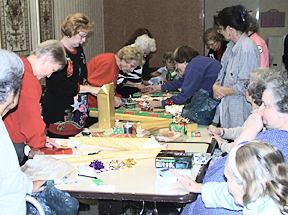Texas Baptist Forum_11204
Posted: 1/09/04
TEXAS BAPTIST FORUM:
Christian worldview
When I hear someone speak of a need to return to a “Christian worldview,” I shudder. The concept sounds good but is interpreted in too many ways to be helpful to the Christian community.
| E-mail the editor at marvknox@baptiststandard.com |
Usually, it is a term loaded with political overtones, promoted by those who have little or no Baptist orientation and belief. It tends toward being a dark cloud seeded with crystals of thought from formerly state-sanctioned church movements. The problem is that although it looks good, the rain of spiritual reform never reaches the ground.
Many of those who perpetuate this concept come from denominations that were birthed as state churches, and their desire is to create some kind of “theocracy” that unfortunately is really government by their own theology. If enacted, such a government would make the outside of man subject to some standard of conformity but do nothing for the heart of man.
It would change Micah's admonition to do justly and love mercy into loving justice and denying mercy. It also would negate Micah's third admonition to walk humbly with God, as such overlords would be doing his service rather than truly serving him.
Didn't Christ come to change hearts and not to whitewash tombs? Didn't he say, “My kingdom is not of this world”?
I believe a Baptist “Christian worldview” would contain two precepts for self-accountability: Love the Lord with all your heart, soul, mind and strength; and love your neighbor as yourself.
John King
Waco
Uncooperative convention
The Southern Baptist Convention needs to change its name. “Baptist” no longer describes who they are.
The SBC ruled out of order the doctrine of the priesthood of the believer in 1988, compromised the Baptist emphasis on religious liberty advocated in the separation of church and state, and forced a creed upon anyone who wishes to serve in the SBC. These are just a few of the examples that prove the SBC is not Baptist at all, but anti-Baptist.
Now, a committee has decided the SBC should no longer associate with other Baptists around the world through the Baptist World Alliance.
Instead, they want to associate with like-minded “conservative evangelical Christians.” They have finally admitted, then, that the SBC is not of the same mind as all of the other Baptists in the world.
Since they admit they are no longer Baptists, they should change their name to more accurately reflect who they are. How about the Southern Convention of Uncooperative Narrow Conservatives?
Wesley Shotwell
Azle
Spiritual blasphemy
Some people claim the Judeo-Christian God and the Islamic Allah are the same. While this affirmation has become politically correct, especially since 9/11, it is spurious and amounts spiritually to blasphemy.
Islam is defined as “the religious faith of Muslims including belief in Allah as the sole deity and in Mohammed as his prophet.” The logical conclusion: God of the Bible and Allah cannot possibly be the same, since Mohammed is nowhere mentioned in holy Scripture as a prophet of God, Allah or anything else.
Also by definition, God and Allah cannot be the same, since the recognition of Allah as “sole deity” rules out the God of Abraham, Isaac, Jesus (the last prophet) and me. To believe that God and Allah are the same is to believe that the Holy Bible and the Koran, the only document in which Mohammed and Allah appear, are both inspired of God, instead of just the holy Scripture. Unthinkable!
Allah is an abstract idol like the Baal or the tangible golden calf, with neither the “prophets of Baal” nor Aaron, the calf's builder, nor Mohammed more than an errant, empty voice, signifying nothing.
But God's Jesus, the Savior, redeemed the world (no conditions). It's called reconciliation.
Jim Clark
Lexington, Ky.
Tremendous success
The new format for the annual meeting of the Baptist General Convention of Texas, tested in Lubbock in November, was a tremendous success, at least if measured by the crowds attending new breakout sessions on a variety of subjects ranging from using demographics to reach lost people in our communities to bringing to our churches college-level classes through the Texas Baptist Laity Institute. These were two of the sessions that I chose. In both there was standing-room only.
Having the missions celebration on Monday night helped to bring a larger attendance to that important part of every BGCT annual gathering of messengers.
Congratulations to outgoing President Bob Campbell, Executive Director Charles Wade and to all of the staff and volunteer committees involved in attempting something new at the annual meeting in order to serve better the churches and their messengers, and doing so with such great results. Well done.
Bill Brian
Amarillo
Good choice
Our congratulations to everyone on the selection of Ken Camp as the managing editor of the Baptist Standard (Dec. 22).
In many years of working with him, Ken has shown the ability to get to the heart of an issue/story and present the essence in an understandable way.
He has earned the respect of people all over Texas and the Southern Baptist Convention.
We are all blessed by having Ken on the Baptist Standard staff at this critical time.
Sam & Polly Pearis
Universal City

